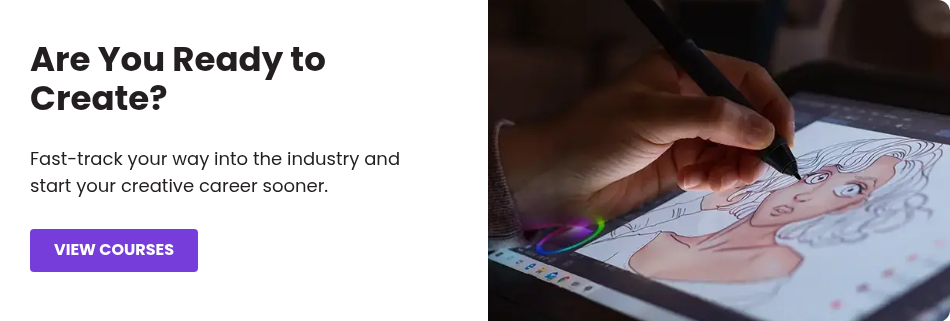We often get asked how old is ‘too old’ to get into visual effects, animation, or video games. The honest answer is that there is no invisible age barrier. The real question you should be asking yourself is - am I driven enough for a creative career?
We delve into why it’s not too late to pursue your dream of working in the film and games industry, see how changing careers later in life can actually be an advantage, and meet artists who are living proof that you're not too old to start a creative career.
You are not alone in changing careers later in life
If you’re asking “Am I too old to be an artist?” you are likely a Millennial, or perhaps a Gen X-er. According to statistics, Millennials change careers, on average, five times in their lifetime. So you’re not alone in making the switch.
People change careers for many reasons, job satisfaction being a key incentive. If you are passionate about film and games, you’re on the right track to building a career in the industry, no matter your age.
Bram Stoker didn’t write Dracula until he was 50. Anna Mary Robertson Moses began her prolific painting career at 78. (In 2006 one of her paintings sold for $1.2 million!)
While studying animation and visual effects, digital art, or game development you’ll be surrounded by people whose passion equals yours, so you’ll always have something fundamental in common with your classmates. Furthermore, by studying your specialisation you will also have access to great minds who can mentor you, providing vital support through your career transition.
So, if you’re not too old to start a career in creative technology, what do you really need to break into the industry? All you need is a willingness and drive to learn.
Here are some action steps to get started:
- Consider why you want to change careers.
- Ask yourself if you have the drive and willingness to learn.
- Start networking with people in the industry to hear what it's like to work in film and games and if it's the right fit for you.
 Read on to hear from a CGS alum who left their engineering job to study VFX in his 30s, and is now working on major projects like Loki (Image: Marvel Studios)
Read on to hear from a CGS alum who left their engineering job to study VFX in his 30s, and is now working on major projects like Loki (Image: Marvel Studios)
The benefits of being a mature-age student
Mature-age students are often more driven than their younger counterparts. Years of experience in the workforce have informed their understanding of what they do and don’t want. Job dissatisfaction can be an extremely motivating factor to finally apply for that film and games degree they’ve always wanted to take.
Education is not the filling of a pot but the lighting of a fire. – W.B. Yeats
With age often comes the confidence to ask questions and, more importantly, to admit when you don’t know something. If you don’t ask, you’ll never know! Life experience helps put things into context and teaches you that challenges are not something to fear. Over the years you’ve probably already acquired a range of tools to deal with solving problems and are ready to face your next challenge head-on.
As a mature-age student, study may already be familiar to you. This is advantageous and often means you don’t have to figure out the techniques that work for you when processing new information. For example: are you a visual, auditory, reading/writing or kinesthetic learner? As a mature-age student, the chances are you already know! Learning how to learn is often overlooked, and having good processes in place can set you up for more rewarding learning experiences.
Action steps:
- Think about how you process new information (visual, auditory, reading/writing or kinesthetic).
- Do you know what area of the VFX pipeline you wish to specialize in? Do you want to be a compositor? FX artist? If you're unsure, explore VFX jobs through our career pathways.
- Write a list of questions you want to be answered so you’re ready to ask VFX experts when the opportunity arises.
The film and games industry is a dynamic place where everyone is learning all the time
The nature of technology is that it’s constantly evolving. We live in a digital age where technological advancement has become the norm and is only gaining momentum. Film and games are no different.
Nothing is constant but change. – Heraclitus
Programs in heavy rotation within the creative industry are regularly updated and improved while new software is constantly in development. These updates are designed to make an artist’s life easier, however, new technology means a learning curve for everyone. So even industry veterans with years of experience are required to level up their learning.

The ability to adapt to a changing world is a highly sought-after skill in the workforce. There’s even a term for it - AQ (Adaptability Quotient). It refers to a person’s aptitude to change at the same speed as technologies, workplaces, and world events. Adaptability is far more valuable than ‘knowing everything’, and some claim AQ is more critical than EQ (Emotional Intelligence Quotient) and IQ (Intelligence Quotient).
Learning is vital: it helps you remain relevant, and encourages you to step outside of your comfort zone.
In addition, furthering your education can boost your confidence and provide you with opportunities to meet new people and build lasting relationships.
Action steps:
- Which software will you need to learn? For example, if you'd like to become an FX Artist—you could start with a 3-month Effects Essentials course to make sure you like FX, or if you already know that's the future career for you, you can pursue a diploma or bachelor of Animation & VFX.
- Keep up to date with all the latest VFX news and software by subscribing to industry newsletters, including CG Spectrum Institute's newsletter.
![]() CGS mentor Mark Pullyblank went to animation school later in life and ended up working on Avatar in New Zealand. (Image: 20th Century Studios)
CGS mentor Mark Pullyblank went to animation school later in life and ended up working on Avatar in New Zealand. (Image: 20th Century Studios)
Your skills are more transferable than you think
Adaptability also includes being able to transfer your current skill set over to a new role. You will be amazed at how many skills you have already picked up from previous careers and life in general that are highly desirable within the film and games industry.
These skills can be both interpersonal (like communication, critical thinking, or time management) and practical (like coding, data analysis, or design).
In many ways, the visual effects and video games industry is just like any other job in that it cannot survive on the technical skills of its employees alone. Working in creative technology requires teamwork, time management, effective communication, a strong work ethic, problem-solving, creativity and much more. These are skills people usually develop over time through experience. So if you are a bit older, there’s a good chance you already possess a lot of them! Don’t believe it? Check out what skills some of the industry’s top people think you need to foster a successful career in VFX.
To break into the industry all you need, along with a passion for learning, is a basic level of computer literacy which most professions these days require anyway. And if you need it, there are courses for computer literacy too! The rest you can build over time.
Action steps:
- Make a list of your transferable skills, don’t forget to add these to your CV!
- Check out what types of film and games jobs are out there and see what skills are required for your dream job.
- List which interpersonal and practical skills you'd like to learn and/or improve upon.
You still have time to start your career in film and games
With at least a few decades left in the workforce, you still have plenty of time to hone your creative and technical skills. At CG Spectrum, our courses take anywhere from 2 weeks to 2 years which is short in the grand scheme of things. What’s even better, is that these courses are online which can help you to operate at a pace that works with your schedule, allowing you to plan your studies around work, family and other commitments.
Changing careers is no small step. There are many things to consider, including financial stability, which commonly involves working while studying. One option is to slowly transition over to your new career in film and games by following the Two Trains theory.
The Two Trains theory begins by remaining on 'train number one', the train you are already riding (i.e. keep working at your current job). Then in your spare time—weekends, evenings, during your commute, early mornings, etc.—you can begin to pursue the work you want to move into. By doing this you have put the wheels of 'train number two' in motion.
The more you work on your passion, the more fuel you add to the second train and the faster it will begin to move. As the second train speeds up you’ll get a glimpse into how riding it will feel.
As you put more time and energy into the 'train number two' the faster it becomes, until one day you will notice it’s caught up to the first train. This is your moment to leap from the first to the second train, avoiding waiting at a platform or moving backwards. You may need to straddle two trains for a while, which can be stressful, but using the Two Trains theory can help smooth your transition into your new creative career.
Action steps:
- Look into courses with flexible schedules that allow you to continue working while you study. Online courses are ideal for this!
- Get an industry instructor or mentor so you can get direct feedback on your work from someone in the industry and get that 'second train' moving faster.
Success stories: Artists who switched careers later in life
Still not convinced you can start a career in film and games at any age? Hear from a CG Spectrum mentor and two students who have!
Mark Pullyblank: From manufacturing to animating around the world
CG Spectrum mentor Mark Pullyblank spent much of the 90s working as a musician, bouncing around North America in a tour van. At 33, with two kids and not a lot of money, he decided to go back to school to become an animator.
Despite the challenges of having to support a family while studying, Mark was determined. He worked his manufacturing job during the day and would animate in the evenings. He sent his demo reel to dozens of studios (on VHS tapes back then!) and talked to anyone and everyone he could in the industry.
Your biggest asset is your motivation.
As it turned out, Mark's manufacturing job was his foot in the door. The company owner's wife worked at Rainmaker, a visual effects studio in Vancouver, Canada (now Mainframe Entertainment). His boss put him in touch, and he got his first job in the industry!
Mark has since worked on blockbusters like Avatar, The Hobbit, and Night at the Museum, and he's worked all over the world! Mark was an Animation Supervisor at Rainmaker Digital and Frantic Films, a Senior Animator at Sony Pictures Imageworks, and worked in various departments at Weta Digital in New Zealand.
Going to back to animation school was terrifying, but one of the smartest things I've done.
To anyone considering a career change, Mark says: "Get a kick-ass demo reel, get your work out there on social media, put it on Facebook, LinkedIn, Vimeo, and forums. Shop it around. Befriend other artists, and show them your work. If someone’s going to give you feedback, respect it. Apply it."
Freelance 3D Character Artist (and CGS graduate) Marat Nurgaliyev discusses how he quit his office job in his late thirties and started 3D modeling.
Stephanie Soong: Shifting from a steady career in healthcare to 3D modeling at Pixar
Stephanie Soong, aged 27, had a steady and successful career in healthcare.
"I was working at one of the top 10 hospitals in the United States, building quality improvement projects," says Stephanie.
I had a high salary, great health insurance, and a pension plan. This is what dreams are made of, right? However, I was deeply unhappy and wondering if I was meant to do something else.
Stephanie took the plunge and began studying for a career in VFX.
She hadn't yet finished her 3D modeling course when Pixar awarded her a coveted position in their Undergraduate Program (PUP), a 12-week Pixar internship that prepares you for a Technical Director job. Read Stephanie's story.

Stephanie Soong’s hard work helped her win a Pixar internship.
Lawrence Zalasky: From Industrial Designer to Oscar winner
Lawrence, a former Industrial Designer, was 30 years old when he made the life-changing decision to go back to school to pursue his real passion - animation.
Six years later, I've worked for five VFX studios on 14 feature films, two animated series, and been part of an Oscar-winning team on Blade Runner 2049.
Read the rest of Lawrence's story.

Lawrence Zalasky & the VFX Oscar his team won for Blade Runner 2049.
It's not too late to start your career in visual effects!
It’s not too late to pursue your passion for studying and working in visual effects. Expanding your technical skills with one of our film and games courses is a great way to start.
Not only will you gain hands-on experience, but our degrees and diplomas also focus on helping you develop quality work to add to your portfolio for prospective employers. You’ll also receive additional one-on-one career support in the form of portfolio reviews and interview preparation from CG Spectrum's career development team.
When considering changing to a creative career in film and games just remember-your work should speak for you, not your age!

Related Links




